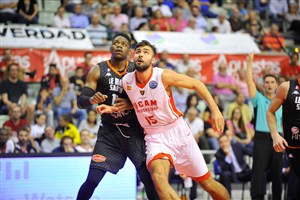
By the numbers: How Tunisia qualified to China 2019
SHEFFIELD (Julio Chitunda's African Message) - Tunisia have been dominant throughout the FIBA Basketball World Cup 2019 African Qualifiers, and it came as no surprise that they became one of the first teams to qualify for next year's China 2019 showdown.
Playing at home or away, the reigning African champions amassed an impressive 9-0 record with three World Cup Qualifiers games yet to be played next month.
Today's column looks back and breaks it down how Tunisia secured their first World Cup ticket since 2010.

WHAT SET TUNISIA APART FROM OPPONENTS:
A month after winning the FIBA AfroBasket 2017 on home soil, Tunisia avoided resting on their laurels, rolled up their sleeves and embarked on a European tour, where they held a number of training camps.
By the time the FIBA Basketball World Cup 2019 African Qualifiers tipped off in November 2017, Tunisia looked in total control of their World Cup destiny.
They showed a terrific team cohesion, which resulted in three straight wins in the first leg of Group A in Yaounde, Cameroon. It was that early and positive start to the competition that sparked Tunisia's dominant campaign.
STATS DON'T LIE:
Tunisia defeated all their three opponents, including Egypt, Morocco, and Angola (expected to be stronger and better equipped) in the first leg of the Second Round by an average of 19 points.
While they scored an average of 79.6 points per game, Tunisia allowed only 52.8 points per contest, which comes up as the lowest in the African Qualifiers.
Only Nigeria moved the ball the better than Tunisia, who registered 21 assists per contest.
KEY PLAYER(S):
There wasn't one in particular. Team cohesion played a huge part in Tunisia's success so far, although the addition of duo Michael Roll and Salah Mejri boosted the North Africans' depth.
Both Omar Abada and Makram Ben Romdhane led Tunisia in scoring with an average of 13 and 12 points each.
SIX
This is the number of teams Tunisia defeated to qualify for the FIBA Basketball World Cup 2019.
Cameroon, Chad, Guinea, Morocco, Egypt and Angola, all crossed Tunisia's path, but no-one were able to contain the Carthage Lions' speed, determination, and efficiency.
16
From 38-year-old Radhouan Slimane to rising star 20-year-old Mohamed Rassil, head coach Mario Palma has used sixteen players over the course of nine qualifying games.
61
Tunisia registered the biggest winning margin in the African Qualifiers so far, demolishing Chad 101-40 in the first leg of Group A in Yaounde, Cameroon.
TOUGHEST GAME
Tunisia deservedly registers an unbeaten 9-0 run in the African Qualifiers, but that didn't come easy. Take Tunisia's 67-66 win against Cameroon as an example.

Cameroon almost denied Tunisia, but the North Africans' suffocating defense paid off, forcing Cameroon to turn the ball over in the dying seconds of the game, which Tunisia capitalized from.
BOTTOM LINE:
Tunisians have made it clear, winning the African Championship last year was the beginning of a new era in the history of African basketball. And, they head to the China 2019 showdown chasing more than their first-ever win in the history of the competition. The Tunisians hope to become the best-placed African team, and as a result, qualify for the 2020 Tokyo Olympics.
So far, things look good for Tunisia.
Julio Chitunda
FIBA
FIBA's columnists write on a wide range of topics relating to basketball that are of interest to them. The opinions they express are their own and in no way reflect those of FIBA.
FIBA takes no responsibility and gives no guarantees, warranties or representations, implied or otherwise, for the content or accuracy of the content and opinion expressed in the above article


















